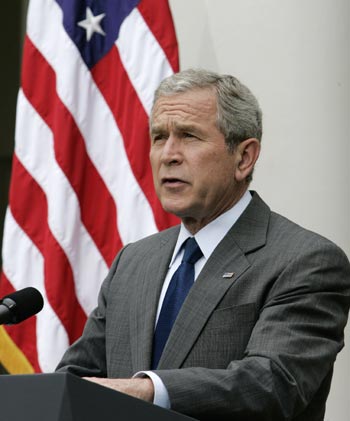U.S. President George W. Bush signed on Thursday a new bill that would provide legal immunity to telecommunication companies that take part in the government's surveillance program.
Before signing the bill in the White House, Bush told audience that the legislation is a landmark that is "vital to the security of our people."

U.S. President George W. Bush makes a statement about the passage of the Foreign Intelligence Surveillance Act by Congress after arriving back at the White House from Japan, July 9, 2008. [Xinhua/Reuters Photo]
The signing ceremony came only one day after the Senate approved the bill, concluding months of debate between Democratic-dominated Congress and the Republican government over surveillance rules and legal community for telecommunication companies involved in the wiretapping program.
Bush said "In the aftermath of 9/11, few would have imagined that we would be standing here seven years later without another attack on American soil. The fact that the terrorists have failed to strike our shores again does not mean that our enemies have given up."
Last August, Congress hastily approved at request of Bush's administration the law, or an update to the 30-year-old Foreign Intelligence Surveillance Act, to allow the government temporarily having more power to intercept foreign communications without a court order even involving Americans.
However, Bush still asked Congress to make the Protect American Act a permanent and expanded law before it is expired on Jan. 31, but was opposed by many Democrats, who hoped to change the law to provide additional oversight when the authorities eavesdrops on U.S. citizens communicating with foreign parties.
Bush and his cabinet have repeatedly demanded the passage of the bill to allow intelligence officials to have tools they need to detect terrorist plots and connection.
However, human rights activists criticized the bill for greenlighting warrantless surveillance of the phone calls and e-mails of Americans who communicate with them.
Before Bush signed the legislation, the American Civil Liberties Union said it would challenge the new law in court.
(Xinhua News Agency July 11, 2008)